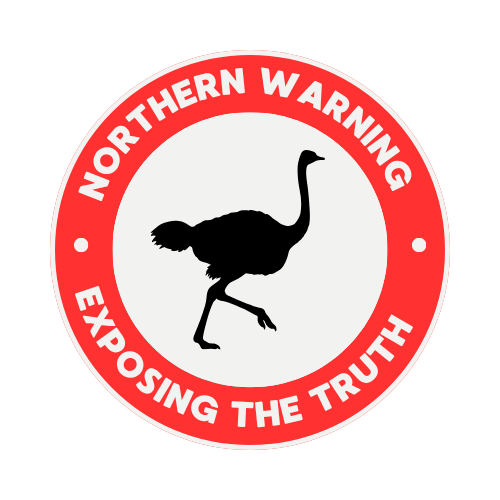This is Northern Warning #1.
I've Given Up on Canada. But America Still Has a Chance.
I'm a Canadian living abroad. I love my country—its people, its landscapes, the values I grew up believing we stood for. But I need to tell Americans something important: what happened on a farm in British Columbia last week is exactly why your Founders wrote the Second Amendment.
This isn't about being pro-gun or anti-government. This is about what happens when citizens have no practical mechanism to resist overreach. Let me tell you a story that should concern anyone who values freedom, regardless of political party.
The Night They Came for the Ostriches
Darkness had barely fallen over Edgewood, British Columbia, when the first gunshots cracked through the rainy November night.
Inside a makeshift pen of straw bales, roughly 330 ostriches huddled together—terrified, confused, surrounded by floodlights and men with rifles. For hours, the volleys continued. Multiple shots in quick succession. Reload. More shots. The sounds echoed across the valley while a handful of protesters stood helpless in the distance, watching hazmat-suited officials and armed RCMP officers who had cordoned off the area.
By morning, some birds were still alive, suffering from their wounds. The shooters had to return to finish the job.
These weren't sick animals. In fact, 85% of the flock had survived an avian flu outbreak and appeared perfectly healthy. But that didn't matter. The government had decided they all had to die, and Canadian citizens—including the farmers who owned them—had no way to stop it.
What Really Happened at Universal Ostrich Farm
Let me give you the facts, because they matter.
In December 2024, an outbreak of H5N1 avian influenza hit Universal Ostrich Farm. Over several weeks, about 70 birds died—roughly 15% of the 468-bird flock. The rest recovered. They appeared healthy. They showed no symptoms.
The farm owners—Karen Espersen, Dave Bilinski, and spokesperson Katie Pasitney—wanted to work with a third party to test individual birds. They believed the survivors had developed natural immunity, potentially valuable for research. They proposed alternatives to mass slaughter.
The Canadian Food Inspection Agency (CFIA) refused.
Instead, the agency invoked its "stamping out policy"—a protocol demanding immediate destruction of every animal on premises where avian flu is detected, regardless of whether individual animals are actually sick. No exceptions. No alternatives. No individual testing.
The farm fought back through the courts. For nearly a year, they battled the order. Even Robert F. Kennedy Jr. and Dr. Mehmet Oz tried to intervene, offering research funding and sanctuary in the United States.
The Supreme Court of Canada heard their final appeal on November 6, 2025, and dismissed it.
That same night, government agents moved in under cover of darkness. They herded the ostriches into a pen and began shooting. The killing went on for hours. When protesters tried to document what was happening, RCMP officers blocked roads "for safety reasons."
By Friday morning, every ostrich was dead.
How Did We Get Here? The COVID Compliance Precedent
Americans watching this might wonder: how does a government show up in the middle of the night and slaughter 330 healthy animals over their owners' desperate objections?
I can tell you exactly how. Because I watched it happen in real-time.
It started in 2020.
Canadians accepted lockdowns without demanding cost-benefit analysis. We accepted PCR testing protocols despite questions about accuracy. We accepted being forbidden to visit dying relatives, attend funerals, or open our businesses. When the government declared what was "essential" and "non-essential," we nodded and complied.
Then came the vaccine mandates. Get the shot or lose your job. Get the shot or lose your ability to board a plane, enter a restaurant, participate in society. The government didn't just recommend medical interventions—it coerced them. And Canadians, by and large, went along.
Each step normalized the next level of control. Each acceptance of emergency powers taught the government a critical lesson: Canadians will comply.
The Freedom Convoy: When We Finally Said No
In early 2022, Canadian truckers had finally had enough. They drove to Ottawa in a peaceful protest against vaccine mandates. They parked their trucks. They barbecued. They sang our national anthem.
Prime Minister Justin Trudeau invoked the Emergencies Act—powers that had never been used since the law's creation. He froze the bank accounts of protesters without trial. He froze accounts of people who had merely donated to the protest. No judge. No hearing. Just financial destruction delivered with a keystroke.
The courts later ruled the use of emergency powers was unjustified. But by then, the precedent was set.
The government learned it could crush dissent. And citizens learned that resistance has consequences.
The Pattern Completes Itself
Fast forward to November 2025, and watch how the pattern repeats with the ostriches.
The same "stamping out" mentality that drove COVID policies—destroy everything preemptively rather than make measured, individual assessments—now applies to a farm where 85% of the birds survived the disease. No individual testing. No consideration of natural immunity. No alternative approaches. Just wholesale slaughter in the name of biosecurity.
When the farmers resisted, the government deployed the same playbook: legal warfare, court after court ruling in favor of state power, and ultimately, enforcement by armed agents in the middle of the night.
The farm owners weren't just fighting for their birds. They were fighting for the principle that government power has limits, that citizens have rights, that there should be alternatives to absolute state control.
They lost every battle.
And here's what Americans need to understand: this wasn't inevitable. This was the direct result of a compliance cascade that began with accepting emergency powers "just this once" for COVID. When you accept emergency powers once, you don't just return to normal afterward. You've taught the government that citizens will comply when threatened with enough fear.
The machinery of coercion doesn't disappear—it just finds new justifications.
Why This Could Never Happen the Same Way in America
Let me be very clear about something, and I say this as someone who used to roll my eyes at American gun culture: the Second Amendment wasn't written so you could hunt deer or shoot at paper targets on weekends.
It was written to prevent exactly what happened in Edgewood, BC.
Your Founders understood something that modern Canadians have forgotten: governments don't voluntarily limit their own power. They expand until they meet resistance. And the ultimate form of resistance—the final check on tyranny—is an armed citizenry capable of saying "no" and meaning it.
Now, before anyone misunderstands: I'm not suggesting Americans should shoot at government agents. I'm saying that when government agents know property owners might be armed and legally justified in defending what's theirs, they think very differently about showing up at midnight to destroy someone's livelihood.
In many US states, you have the legal right to defend your property with lethal force. Castle doctrine isn't just about home invasions by criminals—it's about the fundamental principle that your property is your domain, and no one—including government agents—has unlimited authority to enter and destroy it.
When citizens are armed, government is forced to negotiate. It's forced to offer alternatives. It's forced to respect due process rather than just steamrolling through legal challenges until it gets the outcome it wants.
The difference isn't just legal—it's cultural. Americans have always been more "Don't Tread on Me" than "Trust the Authorities." There's less automatic deference to government power, more skepticism of centralized control, and a bone-deep understanding that freedom isn't granted by the state—it's defended against it.
The Second Amendment ensures that when government exceeds its legitimate authority, citizens have a practical ability to say "this far and no further."
The ostrich owners in BC had no such ability. They could only plead with courts while armed government agents killed their animals in the darkness. In America, that dynamic would be fundamentally different.
A Message for My Democrat Friends
I know many Democrats reading this are skeptical of gun rights. I understand. I used to think that way too. I grew up believing that more gun control meant more safety, that trusting government expertise was simply being reasonable and educated.
But here's what I've learned watching my country from abroad: government overreach doesn't care about your political party.
The government that froze bank accounts during the Freedom Convoy? That was Trudeau's Liberals—the party I once supported. The agencies that ordered the ostrich slaughter? Career bureaucrats who don't change with elections. The pattern of expanding emergency powers? It happens under Conservative governments and Liberal ones alike.
The question isn't whether you trust this government with power. The question is whether you trust any government with unlimited power when there's no mechanism for citizens to resist.
The Second Amendment isn't about Republicans versus Democrats. It's about citizens versus tyranny. And after watching what happened to those ostriches—and before that, to the truckers, and before that, to every Canadian who complied our way into a system where courts consistently rule in favor of state power—I finally understand what the Founders were afraid of.
They weren't afraid of foreign armies. They were afraid of their own government doing exactly what mine just did: showing up in the night with guns to destroy property over the objections of citizens who had no practical way to resist.
What Comes Next: A Warning About Biosecurity
If you think this stops with Canadian ostriches, you're not paying attention to the pattern.
Biosecurity is becoming the new framework for emergency government powers across the Western world. Climate emergencies are being normalized as justification for restrictions on travel, consumption, and industry. Digital IDs and financial control systems are expanding, making it easier for governments to freeze accounts, track movements, and punish dissent.
The playbook is consistent:
- Create fear of an invisible threat
- Demand extraordinary powers to combat it
- Crush anyone who questions the response
- Never fully give the powers back
COVID was the proof of concept. It demonstrated that Western populations will accept dramatic restrictions on liberty when sufficiently frightened. Now governments know what's possible.
Watch for bird flu to become the next crisis. Watch for "environmental emergencies" that require new powers. Watch for "disinformation" laws that criminalize dissent under the guise of public safety.
And ask yourself: if your government decided your property posed a theoretical risk to public health, and courts rubber-stamped their decision to destroy it, what would you do?
In Canada, the answer is: comply or face criminal charges.
In America, you still have options.
The Cost of Surrendering Resistance
The ostriches are dead. All 330 of them, shot in a makeshift pen in the middle of the night because bureaucrats decided they posed a theoretical risk and courts approved the decision at every level.
The owners are devastated. Their life's work is gone. The protesters who gathered to support them faced harassment charges and criminal investigations. And the broader Canadian public? Most don't even know it happened. Or if they do, they figure the government must have had good reasons.
That's the cost of compliance. Not just the immediate loss—the animals, the livelihoods, the property—but the precedent. The normalization. The acceptance that this is just how things work now.
You don't get freedom back by asking nicely once you've surrendered it. You don't vote your way out of a system where courts consistently side with state power and emergency regulations override individual rights. You don't politely request that government respect limits it has already demonstrated it will ignore.
What Americans Should Learn From This
I'm writing this from Mexico, where my husband and I built a location-independent life after watching Canada transform into something we no longer recognized. We're Generation X—old enough to remember when questioning government was considered healthy skepticism, not dangerous extremism.
Here's what I want Americans to understand:
Protect your Second Amendment like your life depends on it. Because in the moment when government overreach comes for your property, your livelihood, or your rights, it might.
Don't surrender emergency powers "temporarily." They never stay temporary. Every power granted during a crisis becomes a tool for the next one.
Question the experts. Real science welcomes scrutiny. When "trust the science" becomes "obey without question," you're not dealing with science anymore—you're dealing with authoritarianism wearing a lab coat.
Remember that compliance is a ratchet. Each time you comply with government overreach, you make the next overreach easier. Each time you accept restrictions on liberty "for safety," you teach the government that fear works.
The ostrich farmers tried every legal avenue. They went through every proper channel. They appealed to every court. They had international experts offering alternatives. None of it mattered, because once government decided to act, Canadian citizens had no mechanism to say no and make it stick.
You still do.
Your Founders Weren't Paranoid—They Were Right
I used to think Americans were paranoid about government tyranny. I thought the Founders' obsession with limiting government power was outdated 18th-century thinking that didn't apply to modern democratic nations.
I was wrong.
The Founders weren't writing the Second Amendment for a world where government respects limits. They were writing it for exactly this world—where 330 healthy animals can be slaughtered in the night because bureaucrats decided it, courts approved it, and citizens had no mechanism to stop it.
They feared government power more than they feared an armed citizenry.
After what I've watched happen in my own country, I can no longer say they were wrong.
The question facing Americans now is whether you'll learn from what happened to us, or whether you'll make the same mistakes and discover too late that once you surrender the ability to resist, you don't get it back.
The ostriches didn't die because of avian flu.
They died because Canadians forgot how to say no to our government.
Please don't let that happen to America.
You've been warned.
Northern Warning is a series documenting government overreach in Canada and its parallel trajectory in America. Subscribe to receive warnings by email.
—Avery Lane
A Canadian in exile



